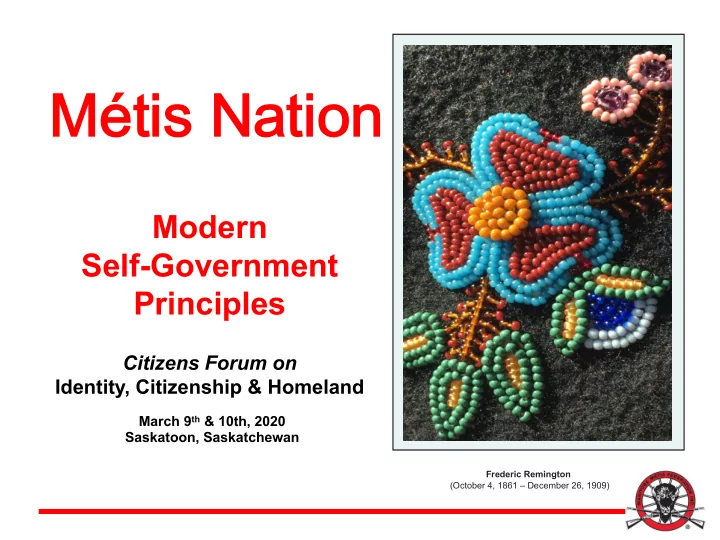

Métis s Nation Modern Self-Government Principles Citizens Forum on Identity, Citizenship & Homeland March 9 th & 10th, 2020 Saskatoon, Saskatchewan Frederic Remington (October 4, 1861 – December 26, 1909)
Presentation Overview 1. Self-Government Declaration; 2. United Nations Declaration;
MMF Self-Government Principles: RESOLUTION OF THE 2019 MANITOBA METIS FEDERATION ANNUAL GENERAL ASSEMBLY Manitoba Métis Self-Government Declaration (September 22, 2019) Unanimously passed the Resolution , which affirms and declares our right of self-determination and our exercise of self-government. Included the UNDRIP principles. UNDRIP (United Nations Declaration on the Rights of Indigenous Peoples)
UNDRIP Principles Canada has developed Principles Respecting the Government of Canada’s Relationship with Indigenous Peoples as the foundation for transforming how it partners with and supports Indigenous peoples , including: Commitment to implement the United Nations Declaration on the Rights of Indigenous Peoples , which sets out the minimum standards for the survival, dignity, and well-being of Indigenous peoples; (United Nations Declaration on the Rights of Indigenous Peoples - 2007)
UNDRIP Principles Article 4, that “Indigenous peoples, in exercising their right to self-determination, have the right to autonomy or self-government in matters relating to their internal and local affairs, as well as ways and means for financing their autonomous functions.” Article 5, that “Indigenous peoples have the right to maintain and strengthen their distinct political, legal, economic, social and cultural institutions, while retaining their right to participate fully, if they so choose, in the political, economic, social and cultural life of the State”; UNDRIP (United Nations Declaration on the Rights of Indigenous Peoples)
UNDRIP Principles Article 9, that “Indigenous peoples have the right to belong to an indigenous community or nation, in accordance with the traditions and customs of the community or nation concerned. No discrimination of any kind may arise from the exercise of such a right”; Article 18, that “Indigenous peoples have the right to participate in decision-making in matters which would affect their rights, through representatives chosen by themselves in accordance with their own procedures, as well as to develop their own indigenous decision-making institutions”; UNDRIP (United Nations Declaration on the Rights of Indigenous Peoples)
UNDRIP Principles Article 33, 1. that “Indigenous peoples have the right to determine their own identity or membership in accordance with their customs and traditions. This does not impair the right of Indigenous individuals to obtain citizenship of the States in which they live”; Article 33, 2 . that “Indigenous peoples have the right to determine the structures and to select the membership of their institutions in accordance with their own procedures”; UNDRIP (United Nations Declaration on the Rights of Indigenous Peoples)
UNDRIP Principles Article 34, that “Indigenous peoples have the right to promote, develop and maintain their institutional structures and their distinctive customs, spirituality, traditions, procedures, practices […]; Article 36, that “Indigenous peoples, in particular those divided by international borders, have the right to maintain and develop contacts, relations and cooperation, including activities for spiritual, political, economic and social purposes, with their own members as well as other peoples across borders”; […]. UNDRIP (United Nations Declaration on the Rights of Indigenous Peoples)
Thank You www.mmf.mb.ca
Recommend
More recommend